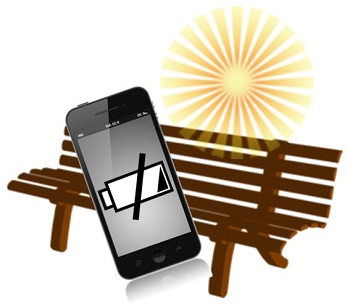A new tech startup called Changing Environments has invented public seating that uses the sun to charge mobiles.
Changing Environments, a startup based in Massachusetts, has now announced its invention of a public bench that acts as a solar powered smartphone battery charger that could be used by Boston residents and visitors to recharge their mobile devices.
The company is also working on collating data on the setting surrounding that urban area.
The smartphone battery charger bench is called the “Soofa”. It has a built in solar panel that can build up the energy needed for members of the public to be able to charge up their mobile devices such as cell phones and tablets using USB ports. Previous efforts to provide the public with USB ports have come to a halt after there were some serious mobile security concerns voiced regarding the risk of hackers that could use them to spread viruses.
The CEO of the company explained that these solar smartphone battery charger benches are equipped with powerful mobile security.
 Chief exec of Changing Environments, Sandra Richter, assures users that the Soofa mobile device charger is equipped with stringent security measures in order to help to prevent attempts to use the USB ports for this type of malicious activities.
Chief exec of Changing Environments, Sandra Richter, assures users that the Soofa mobile device charger is equipped with stringent security measures in order to help to prevent attempts to use the USB ports for this type of malicious activities.
The recharging ports are housed within concrete boxes. These boxes are fitted with security screws that, according to Richter, can be opened only by staff from the company. Should brute force be used to try to force the boxes open, it would automatically disable the electronics within the box.
Beyond providing the public with a free mobile device recharging station, the Soofa also has a computer built into it that gathers data with regards to the urban environment in which it has been placed. This information is wirelessly sent over the internet. Among the types of data that are gathered by the benches is the amount of sunshine that is received by the bench. This collected information will soon be expanded to include other environmental details, such as noise levels, air quality, and the flow of pedestrians around the smartphone battery charger benches.
A recent survey has shown that consumers from the U.K. don’t feel safe shopping or paying with their smartphones.
While the promise of m-commerce and mobile payments has been a large one, recent events in digital security have caused a considerable amount of harm to the confidence that consumers in the United Kingdom are feeling toward the safety of the technology.
The Heartbleed security flaw had a particularly damaging impact on consumer trust in mobile shopping.
Recent research from a firm called Intercede has revealed that following the Heartbleed online and mobile security issue, only 18 percent of consumers in the United Kingdom feel confident that their use of m-commerce and smartphone based payments are actually secure. The same survey showed that more than half – 53 percent – of shoppers in the U.K. say that they would never use mobile banking services, while many among them avoid using any form of financial services over their smartphones – including money transfer apps, shopping sites, and PayPal.
Twenty four percent of the surveyed consumers would not feel safe shopping over m-commerce.
 Over half are already avoiding using mobile apps for money transfer, and 75 percent of those who stated that they were worried about experiencing data loss in case they should ever have their smartphone stolen, said that identity theft was their largest concern.
Over half are already avoiding using mobile apps for money transfer, and 75 percent of those who stated that they were worried about experiencing data loss in case they should ever have their smartphone stolen, said that identity theft was their largest concern.
According to the Intercede CEO, Richard Parris, “Nearly every week we read about another high-profile hacking story in the news.” He added that “From major attacks such as Heartbleed to eBay’s recent data breach, it’s not surprising that consumers just don’t trust mobile security. This is throttling the mobile economy. But with the mobile device boom set to continue, it’s clear that security needs a radical revamp.”
The survey results were quite interesting when looking at the responses given from the various age groups. While it was expected that those in the age bracket of 18 to 24 might be those that were most likely to be comfortable with m-commerce and payments, concerns over mobile security of financial and personal information spanned all of the age groups. As a whole, 54 percent expressed concern regarding the security of their smartphones. That said, it was the 13 to 24 years old age group that were the most distrustful when it came to smartphone based banking and financial services.
 Chief exec of Changing Environments, Sandra Richter, assures users that the Soofa mobile device charger is equipped with stringent security measures in order to help to prevent attempts to use the USB ports for this type of malicious activities.
Chief exec of Changing Environments, Sandra Richter, assures users that the Soofa mobile device charger is equipped with stringent security measures in order to help to prevent attempts to use the USB ports for this type of malicious activities.
 Over half are already avoiding using mobile apps for money transfer, and 75 percent of those who stated that they were worried about experiencing data loss in case they should ever have their smartphone stolen, said that identity theft was their largest concern.
Over half are already avoiding using mobile apps for money transfer, and 75 percent of those who stated that they were worried about experiencing data loss in case they should ever have their smartphone stolen, said that identity theft was their largest concern.